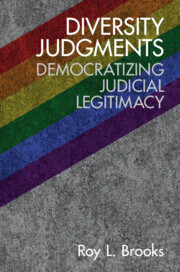Book contents
- Diversity Judgments
- Diversity Judgments
- Copyright page
- Dedication
- Contents
- Preface
- Acknowledgments
- Introduction
- Part I Asian Americans
- Part II African Americans
- Part III Women
- Part IV Latinx
- Part V Native Americans
- Part VI LGBTQ
- Part VII Intersectionality
- Part VIII Outsiders v. Outsiders
- Part IX White Males
- 19 McDonald v. Santa Fe Trail Transportation Co. (Employment Discrimination)
- 20 City of Atlanta v. Rolfe (Law Enforcement)
- Part X Situational Outsiders
- Index
20 - City of Atlanta v. Rolfe (Law Enforcement)
from Part IX - White Males
Published online by Cambridge University Press: 10 March 2022
- Diversity Judgments
- Diversity Judgments
- Copyright page
- Dedication
- Contents
- Preface
- Acknowledgments
- Introduction
- Part I Asian Americans
- Part II African Americans
- Part III Women
- Part IV Latinx
- Part V Native Americans
- Part VI LGBTQ
- Part VII Intersectionality
- Part VIII Outsiders v. Outsiders
- Part IX White Males
- 19 McDonald v. Santa Fe Trail Transportation Co. (Employment Discrimination)
- 20 City of Atlanta v. Rolfe (Law Enforcement)
- Part X Situational Outsiders
- Index
Summary
Three police officers stand by watching their white partner, with excruciating deliberation and nonchalance, unafraid of being videotaped, dig his knee into the neck of an unarmed, nonviolent, compliant, and subdued African American male handcuffed and pinned to the ground repeatedly calling out “I can’t breathe” before taking his final breath after almost nine-and-one-half minutes of slow death. Protests erupted in the United States and around the world in late May 2020 over the senseless and racist death of George Floyd. The police officers involved in the murder of George Floyd were prosecuted but had not gone to trial at the time of this writing. George Floyd’s public execution follows an all-too familiar pattern of police encounters involving unarmed black suspects. It harkens back, most particularly, to the 1991 incident in which Rodney King, an unarmed African American male, was savagely beaten in public by four white Los Angeles police officers. Like the murder of George Floyd, the beating of Rodney King was captured on camera, executed with savage cruelty, and sparked protests around the country. State criminal charges were brought against the police officers, yet only one, Officer Powell, was convicted, but merely of assault.
- Type
- Chapter
- Information
- Diversity JudgmentsDemocratizing Judicial Legitimacy, pp. 479 - 516Publisher: Cambridge University PressPrint publication year: 2022



